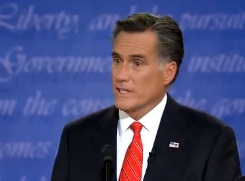Just in Time for Halloween: Obama and Romney Scared of … Candy?

President Obama and Mitt Romney are apparently objecting to CNN’s Crowley, who is set to moderate tomorrow’s presidential debate. Both candidates are complaining to the Commission on Presidential Debates (CPD), which regulates presidential debates and has been called upon in the past by watchdog groups to make accessible the contracts struck by candidates prior to debates but has failed to do so this year.
What gives here?
Is it not the job of the Fourth Estate to vigorously challenge candidates, and ask aggressive followup questions? Or are journalists merely to be timekeepers for candidates as they recite scripted talking points their handlers have drilled them on so much that their answers are more rehearsed than real?
The debate will be in town hall format, meaning the questions will be picked from the audience. That’s good. These men are competing for the Presidency, not to win American Idol. Looking good is not enough. Nor is it all about preparation. Though both are former prep school boys who no doubt prepped plenty to get into Harvard, they can’t “Stanley Kaplan” their way “in” this time. It’s in the public interest to be able to see them both thinking on their feet in a tight spot where they won’t get the questions in advance. Neither should they be able to control the moderator or force her ahead of time to agree to let them jaw without the threat of–horrors!–a followup question.
Lest I sound overly cynical, to the extent that the “memorandum of understanding” to which the candidates have agreed stipulates the focus remain on audience questions, it may be productively intended. But the broader question is, why is this memorandum, in essence a pre-debate contract struck by the candidates, not public information?
Apparently watchdog organizations have asked this question. And while Time magazine’s Mark Halperin somehow managed to get his hands on a copy of this year’s, it was not made easily available to the press or public.
An organization called Open Debates obtained the “memorandum of understanding” for the 2004 and 1988 presidential debates.
Regarding the debate moderators, the 2004 agreement stated: “If any proposed moderator fails to execute a copy of this agreement at least seven (7) days prior to the proposed date of the debate he or she is to moderate, the two campaigns will agree upon and select a different individual to moderate that debate.”
While it’s being reported that Crowley is not bound to this year’s agreement (in other words, the stipulations that she do her job in a way both candidates approve of is not legally binding), am I alone in finding the language from the 2004 agreement troubling? If this year’s is anything like it, it’s as if the candidates have veto power over any moderator who isn’t agreeing ahead of time to ask the questions the way they want them asked (or to coddle them and let them off the hook, perhaps?)
For her part, Crowley is standing her ground and not ceding to the campaigns’ demands that she assure them of whatever it is that they are stipulating via secret handshake. This is important for her, for political journalism in this country, and for the health of our Republic. It is vital that the press not be cowed by politicians or administrative bodies who would dictate to us our role. Because once media is regulated, it cannot perform its function in holding government accountable to the people.
In plain English, if journalists aren’t completely free to ask politicians the tough questions, the people will soon be getting screwed. That’s the way it works in most of the world. And that’s why in most places, people are disposable to government, not the other way around.
Regarding the concern that the focus stay on audience questions and not those of the moderator, or that she be objective, over-regulating in order to achieve an outcome is not usually a good idea (and as a conservative, Mr. Romney in particular ought to know that).
Let the public be the judge of whether or not Ms. Crowley does a fair job, balances a probing approach with deference to the audience and candidates, etc. As Fox News’ Greta van Susteren wrote today, “Candy Crowley is a pro with years and years of real experience … but if a candidate fears what Candy might ask at a debate, what happens when the candidate faces world leaders?”
This entry was written by Heather Robinson and posted on October 16, 2012 at 6:28 pm and filed under Commentary. permalink. Follow any comments here with the RSS feed for this post. Keywords: . Post a comment or leave a trackback: Trackback URL. */?>




